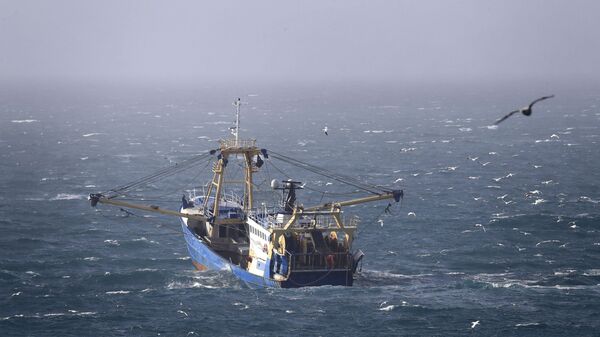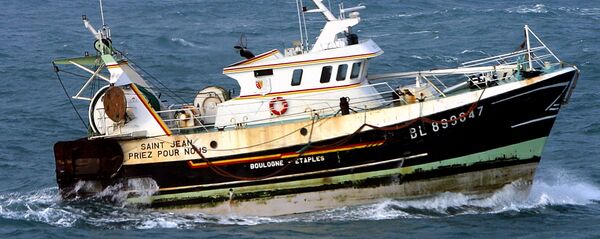Journalist Marcus Stead explains just how the fishing industry has been compromised in the United Kingdom and why the ongoing Brexit negotiations between the UK and EU are unhelpful for British businesses.
Sputnik: What is your opinion on the ongoing Brexit negotiations?
Marcus Stead: It's absolutely extraordinary just how finely they're cutting these negotiations. Due to COVID dominating the news agenda, events taking place in Brussels aren't being given the prominence they otherwise would indeed deserve. The Brexit negotiations are not something that can be taken right up until midnight on New Year's Eve. It's now early November and the entire business community needs to know where it stands so that importers and exporters can prepare to implement whatever the reality will be from the start of January. The end of the year is now just nine weeks away. The entire business community can handle bad news a lot better than they can handle uncertainty. If you've received bad news in any area of your life, you can act accordingly. If there is a poor deal coming or no deal at all, businesses can use the time to adapt to adjust for all that.
Millions of us are going through a difficult enough time at the moment with a pandemic and not being able to conduct business or work in the usual way. The lingering uncertainty is doing nobody any good at all. It's particularly disappointing that the Brexit negotiations weren't concluded by mid-October, which was the UK government's original deadline. But we are where we are; negotiations have continued throughout the weekend, it's likely we'll have a much clearer idea as to whether there'll be a deal or not come Wednesday or Thursday of this week. And it appears there are two real sticking points that are making a deal difficult.
Sputnik: What are these key issues?
Marcus Stead: The first is fishing. The EU wants to maintain its rights to Britain's fishing waters. Under the common fisheries policy, all member states are given access to EU waters via quotas. The UK has a particularly large coastal area, 756,000 square kilometres, easily the biggest when the UK was in the EU. The next nearest is the Republic of Ireland with 410,000 square kilometres. Between 2006 and 2016, an average of 760,000 tonnes of fish were caught by EU countries in UK waters each year compared to just 90,000 tonnes by UK fishermen in EU waters. But let's be frank about this: there's a danger that the UK could overplay its hands on fishing. Since entering what was then the EEC in 1973, the British fishing industry has been utterly decimated as a direct consequence. The figures I just quoted back that up. Fishing does feel emotionally important in terms of negotiations as a result, but in terms of fishing's economic importance, it is minuscule. In 2016, turnover for the entire UK fishing industry was 725 million pounds. To put that into perspective, the turnover for Harrods department store alone was two billion pounds.
The second sticking point is the issue of state aid. The UK government has stated its position, namely that it wants to set its own rules on the state's support given to businesses. From the EU's point of view, state aid is defined as any state spending that potentially distorts trade between member states. The EU state rules are enforced by the European Commission and the compromise in this area risks giving the commission a permanent say in the United Kingdom's domestic affairs, which will outrage many Brexiteers. Cabinet Office Minister Michael Gove has made his stance on this clear by saying that when it comes to state aid, in free trade agreements, it is unusual for it to include anything beyond limited and specific provisions on subsidy policy, mainly in relation to issues of transparency.
In that regard, Mr Gove says that the EU has already set precedents on the limits in interference in other countries' spending on state aid with the free trade agreements already in place with Canada and Japan. The issue of state aid takes on new importance as we continue to battle the COVID pandemic. In terms of the economy, one of the big advantages of a full and complete Brexit will be the flexibility for the government to target aid to specific industries that have been decimated by the pandemic. In the months ahead, it will become clear that the sectors demanding state aid will be enormous, from entertainment to sport, to the likelihood that railways will need to be renationalised as the enormous drop in passenger numbers will result in private rail operators being unable to make a profit. So there's a lot at stake in the next few days.
Sputnik: You mentioned earlier that fishing doesn't economically pack the punch that it used to. It seems to be more of a symbolic gesture to fight for the fishing waters of the UK from the government. Do you think this is a key area where Boris Johnson and his Brexit negotiators could compromise? Or would that do too much damage to the general public's perception of Brexit?
Marcus Stead: In terms of the fishing industry's economic importance, it really is minuscule, but it's very much an emotional thing. The British fishing industry was far bigger in 1973 than it is today. So to be seen to be backing down on fishing would feel like a betrayal in the fishing communities of Britain, both on the south coast and in the Yorkshire area and so forth, and Humberside and everywhere like that. In terms of economic importance, I'm afraid the British fishing industry has been decimated since 1973. But the government cannot be seen to be backing down on this because of the emotional attachment many Brexiteers in those areas have to fishing and it will be seen as a sell-out if a compromise was reached. That's the emotional reality, but in terms of economics, I'm afraid the fishing industry is minuscule in Britain now.



